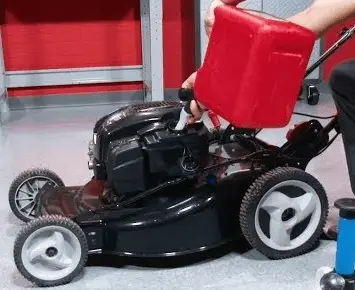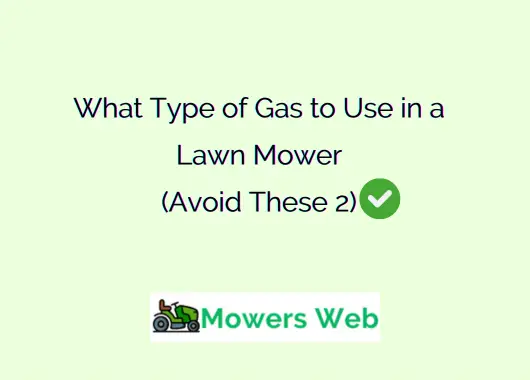Many homeowners make the mistake of filling their mower’s tank with whatever gas is available, but doing so can lead to engine issues, reduced efficiency, and expensive repairs down the line.
In this guide, we’ll break down exactly what kind of gas is best for your lawn mower, how to avoid common fuel mistakes, and tips for keeping your mower in top shape. Let’s jump in.

What Type of Gas to Use in a Lawn Mower
The best type of gas to use in a lawn mower is unleaded gasoline with an octane rating of 87 or higher, and no more than 10% ethanol (E10). Ethanol-free gas is ideal, but if unavailable, ensure the ethanol content doesn’t exceed 10% to prevent engine damage and corrosion.
Avoid higher ethanol blends like E15 or E85, as they can harm small engines. Always use fresh gas, and consider adding a fuel stabilizer if storing the mower for extended periods.
Read Can I Use Trufuel in My Lawn Mower(5 Benefits)
Best Type of Gasoline for Lawn Mowers
For most lawn mowers, the best gasoline is fresh, unleaded fuel with an octane rating of 87 or higher. This is regular, everyday gas that you’d use in a car. But beyond the octane level, there are other factors to consider.
1. Use Gas with No More Than 10% Ethanol (E10)
Ethanol is a common additive in gasoline, but it can cause problems in small engines like those in lawn mowers.
Ethanol attracts moisture, which can lead to corrosion in the fuel system, especially when the mower is stored for long periods. Over time, ethanol can also break down rubber and plastic components in the engine.
To avoid these issues, use gasoline that contains no more than 10% ethanol (E10). Some stations even offer ethanol-free gasoline, which is ideal for small engines if you can find it.
2. Avoid High Ethanol Gas (E15, E85)
Higher ethanol blends, like E15 (15% ethanol) or E85 (85% ethanol), should never be used in lawn mowers.
These blends are designed for vehicles with engines specifically built to handle higher ethanol levels, like flex-fuel vehicles. Using these fuels in your lawn mower can lead to severe engine damage.
3. Consider Premium Gasoline
While premium gasoline (91 octane or higher) is often marketed as “better” or “cleaner,” it’s usually unnecessary for lawn mowers.
Mowers are designed to run on regular unleaded fuel, and using premium gas likely won’t improve performance or longevity. In fact, it’s often a waste of money unless your owner’s manual specifically recommends it.
Read Kohler Engine Starving for Fuel(5 Quick Ways To Fix)
Lawn Mower Engine
It’s important to understand what kind of engine your lawn mower has. Most modern lawn mowers run on four-stroke engines, while some smaller or older models may have two-stroke engines.
Each type has slightly different fuel requirements, so knowing your engine type is the first step.
- Four-stroke engines: These engines are designed to run on unleaded gasoline and require separate oil for lubrication.
- Two-stroke engines: These engines need a gas-oil mixture, which is why they’re commonly seen in smaller mowers and handheld equipment like string trimmers.
Read What is Correct Position for Lawn Mower Blade (Find Out Here)
Importance of Fresh Gasoline
Using fresh gasoline is key to keeping your mower running smoothly. Gasoline starts to degrade after about 30 days, especially if it contains ethanol. Old gas can gum up the carburetor and cause starting problems, rough idling, or stalling.
If you’re not using your mower frequently or are storing it for the winter, consider adding a fuel stabilizer to the gas. Stabilizers can extend the life of gasoline up to 12 months, preventing it from breaking down and gumming up your engine.
What About 2-Stroke Engines?
For lawn mowers with two-stroke engines, you’ll need to mix gasoline with a special two-cycle engine oil.
The proper gas-to-oil ratio will depend on your engine, so be sure to check your owner’s manual for the correct measurements. The most common ratios are 40:1 or 50:1, meaning 40 or 50 parts of gas to 1 part of oil.
It’s important not to mix more oil than necessary, as this can lead to excess smoke and carbon buildup in the engine. On the flip side, too little oil can cause severe engine damage due to poor lubrication.
Signs You’re Using Wrong Mower Gas
- Difficulty starting: If your mower has trouble starting or needs multiple attempts, the fuel might be stale or contain too much ethanol.
- Poor performance: If your mower stalls frequently or doesn’t run smoothly, improper fuel may be to blame.
- Knocking or pinging sounds: These noises indicate that the engine is not running efficiently, which could be due to incorrect octane levels or ethanol content.
- Excessive smoke: Especially common in two-stroke engines, too much oil in the fuel mix can cause the engine to smoke more than normal.
Read Low Oil Symptoms in Lawn Mowers (Don’t Ignore These Signs)
How to Store Gasoline for Your Lawn Mower
- Use a clean, sealed container: Store gasoline in an approved gas can with a tight seal. This prevents air and moisture from getting in, which can degrade the fuel.
- Keep it in a cool, dry place: Store gasoline in a place where it won’t be exposed to heat or direct sunlight, as this can speed up the breakdown of the fuel.
- Label your gas can: If you use different gas for your car, mower, or two-stroke equipment, label your cans to avoid mix-ups.
Read How to Store Lawn Mower in Garage (Do these 3 Things)
Winterizing Your Lawn Mower’s Fuel System
When the mowing season ends and it’s time to store your mower for the winter, preparing the fuel system can prevent problems when you fire it up again in the spring. Here’s a simple process to winterize your mower:
- Run the mower until the fuel tank is empty. This prevents gas from sitting in the carburetor and going stale over the winter.
- Add fuel stabilizer if you prefer to leave some gas in the tank. After adding the stabilizer, run the engine for a few minutes to distribute it through the system.
- Store the mower in a dry place. Moisture can seep into the fuel system during storage, causing rust and corrosion.
FAQ
Does it matter what type of gas you put in a lawn mower?
Yes, it absolutely matters. Lawn mowers are designed to run on specific types of fuel, typically unleaded gasoline with an octane rating of 87 or higher.
Using gas with too much ethanol, like E15 or E85, can cause engine problems, corrosion, and damage. Always use gas that contains no more than 10% ethanol (E10) to avoid these issues.
What kind of gas do you put in a lawn mower?
For most modern lawn mowers, you should use regular unleaded gasoline with an octane rating of 87 or higher. It’s important to use gas with no more than 10% ethanol (E10) to prevent moisture buildup and corrosion in your engine. Ethanol-free gas is even better if you can find it.
How do I know if my mower is 2 or 4-stroke?
To determine whether your mower has a 2-stroke or 4-stroke engine, check the following:
- Oil system: If your mower has a separate oil reservoir for engine lubrication, it’s likely a 4-stroke engine. Two-stroke engines require a gas-oil mixture.
- Check the manual: The owner’s manual will specify the engine type.
- Engine markings: Some mowers have labels or markings near the engine indicating the type.
What do I mix with gas for a lawn mower?
If you have a 2-stroke engine, you’ll need to mix two-cycle engine oil with the gasoline. The correct ratio will be specified in your owner’s manual, but common ratios include 40:1 or 50:1 (gasoline to oil).
For 4-stroke engines, no oil should be mixed with the fuel, as these engines have a separate oil reservoir.
What type of petrol for a lawn mower?
In most cases, you should use unleaded gasoline with an octane rating of 87 or higher. Look for gas that contains no more than 10% ethanol (E10), or use ethanol-free petrol if it’s available in your area.
Do all lawn mowers use mixed gas?
No, not all lawn mowers use mixed gas. Only 2-stroke engines require a gas-oil mixture. Most modern mowers have 4-stroke engines, which use regular unleaded gas without any oil mixed in, as the oil is stored separately for lubrication.
Final Word
Choosing the right type of gas for your lawn mower is essential to maintaining its performance and longevity.
For most modern mowers, unleaded gasoline with an octane rating of 87 or higher and no more than 10% ethanol is the way to go.
Avoid high ethanol blends like E15 and E85, and if your mower has a two-stroke engine, make sure to use the correct gas-oil mixture.




